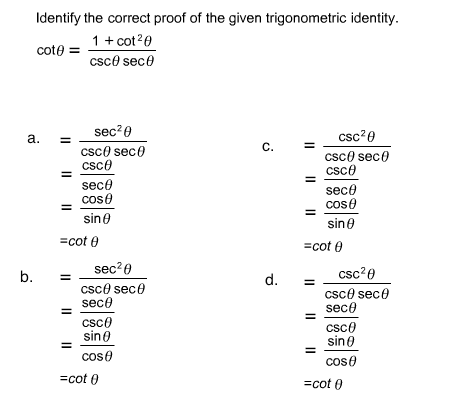First, let's simplify 1+cot^2(theta):
Recall that cot(theta)=cos(theta)/sin(theta), so it follows that cot^2(theta)=cos^2(theta)/sin^2(theta)
1+cot^2(theta)=1+cos^2(theta)/sin^2(theta)=sin^2(theta)/sin^2(theta) + cos^2(theta)/sin^2(theta)=(sin^2(theta)+cos^2(theta))/sin^2(theta)
Now, recall that sin^2(theta)+cos^2(theta)=1, so our numerator becomes 1
1/sin^2(theta)=csc^2(theta)
Thus far, we have
csc^2(theta)/(csc(theta)sec(theta))
Simplify:
csc^(cancel(2)1)(theta)/(cancel(csc(theta))sec(theta))
csc(theta)/sec(theta)
Recall that csc(theta)=1/sin(theta), sec(theta)=1/cos(theta)
So,
csc(theta)/sec(theta)=(1/sin(theta))/(1/cos(theta))=1/(sin(theta)/cos(theta))
Because (a/b)/c=a/(bc)
1/(sin(theta)/cos(theta))=cos(theta)/sin(theta)=cot(theta)
because 1/(a/b)=b/a
This proof falls in line with c.

